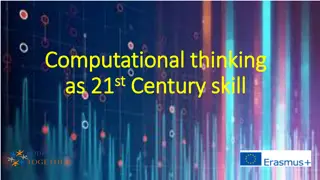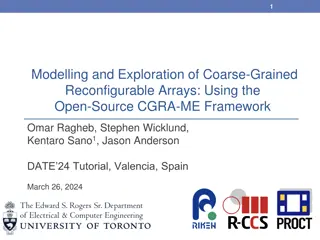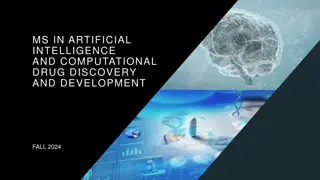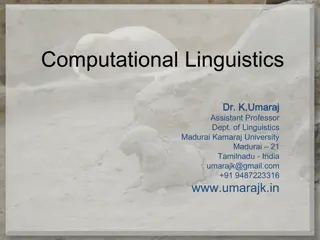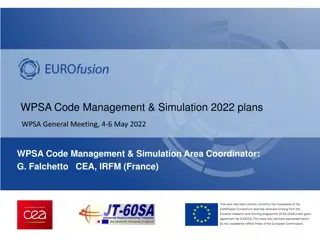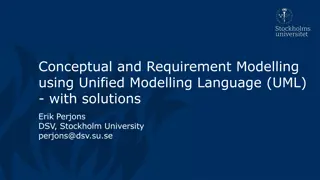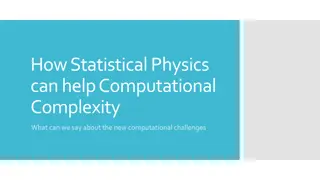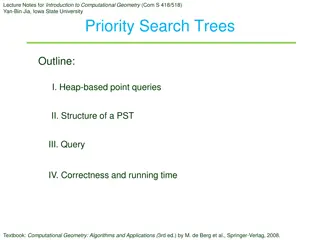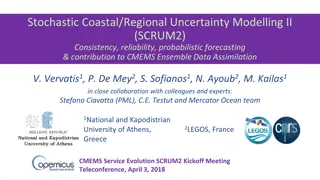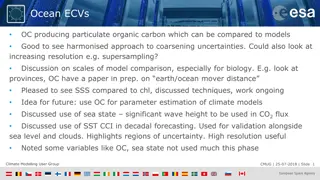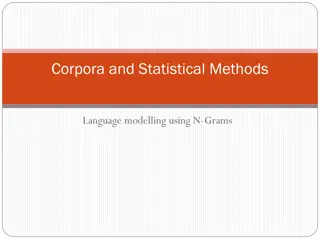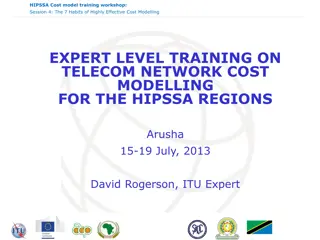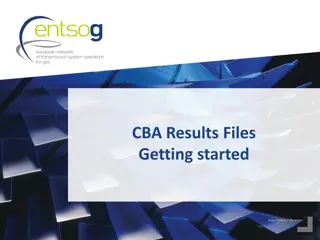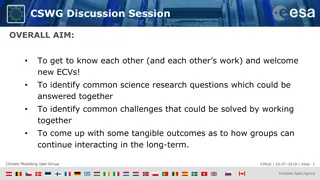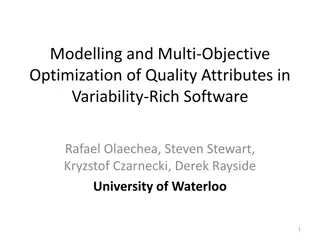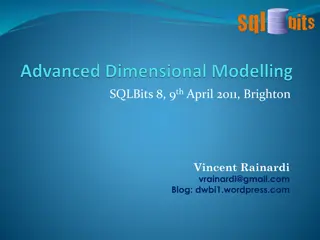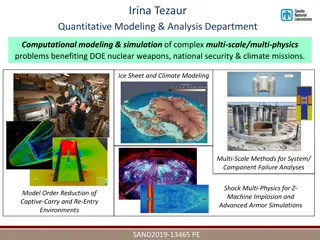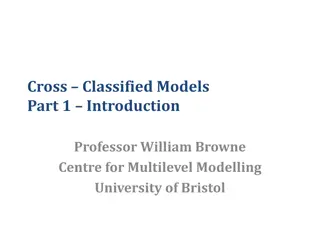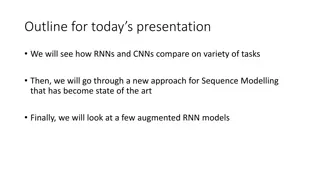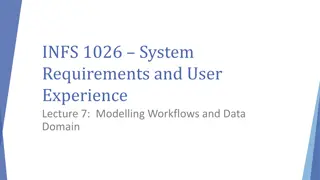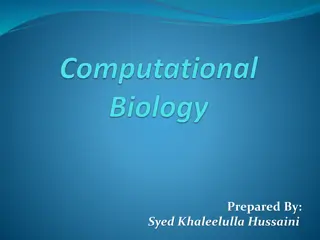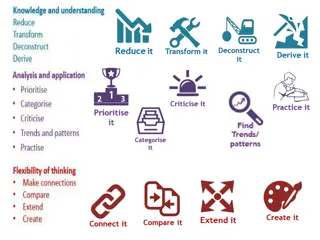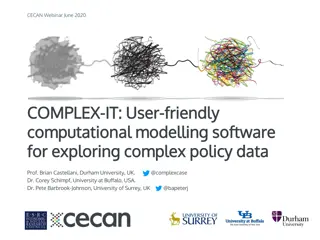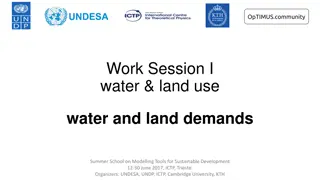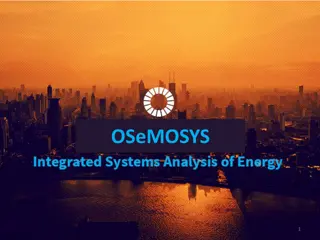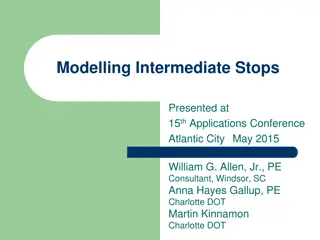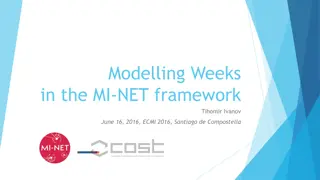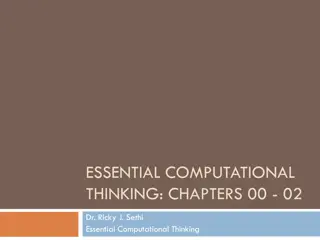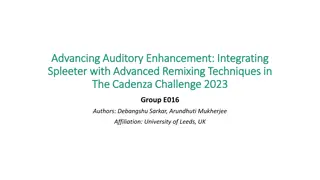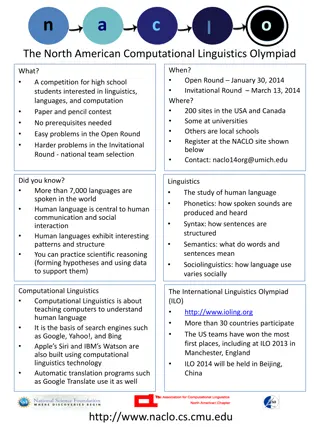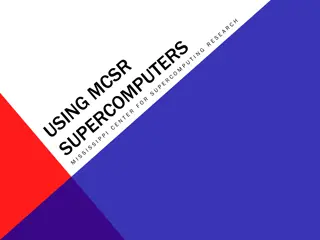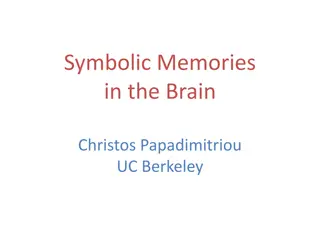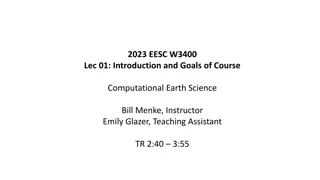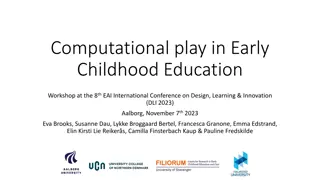Business Modelling and Innovation for Holistic Understanding and Growth
Explore the CGC Aarhus University International Summer Internship Program in Denmark focusing on business modelling and innovation. The program offers a comprehensive learning experience for graduate and postgraduate students, including online sessions and weeks in Denmark. Discover the significance
4 views • 14 slides
Tradeoffs Between Water Savings and GHG Emissions in Irrigated Agriculture
This study examines the tradeoffs between water savings, economic impact, and greenhouse gas emissions resulting from technological changes in the irrigation industry. Key objectives include estimating water savings for different crops, quantifying GHG emissions from new irrigation technologies, and
0 views • 24 slides
Modelling Estuarine Habitats in the Upper Sea Scheldt: Human-Induced Adaptations
Explore a research study on modelling estuarine habitats in the Upper Sea Scheldt under various human-induced channel and floodplain adaptations. The study examines the impact of interventions on habitat size, water quality, ecosystem, and more, providing insights into the future of the estuarine en
3 views • 13 slides
Software Development Life Cycle - Threat Modelling Initiation
Threat modelling should commence at the early stage of the software development life cycle to identify potential security risks and vulnerabilities effectively. It should ideally begin during the requirement analysis and continue throughout development, testing, and maintenance phases to ensure robu
3 views • 27 slides
Computational thinking as 21st Century skill
Computational thinking is a critical skill for the digital age, involving problem-solving techniques that enable computers to process information effectively. It precedes programming and requires breaking down complex problems into manageable steps. Educators emphasize computational thinking exercis
7 views • 4 slides
Modelling and Exploration of Coarse-Grained Reconfigurable Arrays Using CGRA-ME Framework
This content discusses the CGRA-ME framework for modelling and exploration of Coarse-Grained Reconfigurable Arrays (CGRA). It covers the objectives, architecture description, inputs required, and tools included in the framework. CGRA-ME allows architects to model different CGRA architectures, map ap
2 views • 33 slides
Master's Program in Computational Drug Discovery and Development - Fall 2024 Curriculum
This Master's program offers a comprehensive curriculum focusing on Artificial Intelligence, Computational Drug Discovery, and Development. With a blend of cutting-edge technologies and practical applications, students delve into techniques, AI/ML, big data mining, modeling, and more. Through intens
1 views • 7 slides
Understanding Computational Linguistics and Natural Language Processing
Explore the fascinating fields of Computational Linguistics and Natural Language Processing (NLP), delving into their development, applications, and significance. Learn about the study of human languages in computational models, the importance of corpora in linguistic research, and the various types
1 views • 33 slides
EUROfusion WPSA Code Management and Modelling Activities 2021-2022
EUROfusion's WPSA Code Management and Modelling activities for 2021-2022 focus on developing operation-oriented tools and synthetic diagnostics for JT-60SA scientific exploitation. The tasks include discharge simulator development, breakdown simulator optimization, Energetic Particle stability analy
0 views • 12 slides
Understanding Conceptual and Requirement Modelling Using UML
Enterprise and system models play a crucial role in the business world. This collection of images showcases various aspects of conceptual and requirement modelling using Unified Modelling Language (UML). From business process models to human interactions with software systems, these visual represent
1 views • 92 slides
Understanding Computational Complexity Through Statistical Physics
In the age of vast data growth, tackling complex computational problems is crucial. Statistical physics can provide insights into handling the new challenges arising from the exponential increase in data. As we delve into understanding the complexity of computational tasks, it becomes evident that e
0 views • 24 slides
Introduction to Priority Search Trees in Computational Geometry
This lecture outlines the structure and query process of Priority Search Trees (PST) in computational geometry. It covers heap-based point queries, range trees for windowing queries, handling query ranges in 1D and 2D spaces, and using heaps to efficiently handle query ranges. The content discusses
1 views • 18 slides
Stochastic Coastal Regional Uncertainty Modelling II (SCRUM2) Overview
SCRUM2 project aims to enhance CMEMS through regional/coastal ocean-biogeochemical uncertainty modelling, ensemble consistency verification, probabilistic forecasting, and data assimilation. The research team plans to contribute significant advancements in ensemble techniques and reliability assessm
0 views • 28 slides
Insights from Climate Modelling User Group Meeting - July 2018
Discussion at the Climate Modelling User Group meeting highlighted the use of Ocean ECVs, with a focus on organic carbon production and model comparisons. Key topics included increasing resolution, biogeochemistry predictions, and validation using OC CCI data. Various WP projects were also discussed
1 views • 4 slides
Understanding N-Gram Models in Language Modelling
N-gram models play a crucial role in language modelling by predicting the next word in a sequence based on the probability of previous words. This technology is used in various applications such as word prediction, speech recognition, and spelling correction. By analyzing history and probabilities,
0 views • 101 slides
Expert Training on The 7 Habits of Highly Effective Cost Modelling
In this workshop session by David Rogerson, an ITU expert, participants learn the key habits of successful cost modelling in the telecom industry. The session covers identifying, illustrating, remembering, and implementing these habits for effective regulatory cost-modelling practices, with a focus
0 views • 23 slides
Understanding CBA Results Files and Modelling Outputs
The content provides a detailed guide on accessing and utilizing CBA Results Files, including tips on reading the CBA Methodology and understanding various indicators and economic templates. It also highlights the importance of analyzing disrupted rates, quantities, flexibility, and other key compon
0 views • 15 slides
Climate Modelling User Group Discussion Session Overview
The Climate Modelling User Group (CMUG) discussion session aims to foster collaboration among members, welcome new participants, identify common research questions and challenges, and establish long-term interaction mechanisms. The session includes presentations on ECV consistency and planetary visi
0 views • 15 slides
Modelling and Optimization of Quality Attributes in Software Variability
Modelling and multi-objective optimization of quality attributes in variability-rich software is crucial for customizing software functionality to meet stakeholders' diverse needs. This involves addressing conflicting quality requirements such as cost, reliability, performance, and binary footprint
0 views • 34 slides
Advanced Dimensional Modelling: Strategies for Effective Data Handling
Explore advanced techniques in dimensional modelling such as handling rapidly changing dimensions, snowflaking dimensions, and dealing with very large dimensions. Learn about different types of dimension structures, fact tables, and their combinations to optimize data storage and retrieval efficient
0 views • 44 slides
Advancing Computational Modeling for National Security and Climate Missions
Irina Tezaur leads the Quantitative Modeling & Analysis Department, focusing on computational modeling and simulation of complex multi-scale, multi-physics problems. Her work benefits DOE nuclear weapons, national security, and climate missions. By employing innovative techniques like model order re
0 views • 6 slides
Understanding Cross-Classified Models in Multilevel Modelling
Cross-classified models in multilevel modelling involve non-hierarchical data structures where entities are classified within multiple categories. These models extend traditional nested multilevel models by accounting for complex relationships among data levels. Professor William Browne from the Uni
0 views • 13 slides
Exploring RNNs and CNNs for Sequence Modelling: A Dive into Recent Trends and TCN Models
Today's presentation will delve into the comparison between RNNs and CNNs for various tasks, discuss a state-of-the-art approach for Sequence Modelling, and explore augmented RNN models. The discussion will include empirical evaluations, baseline model choices for tasks like text classification and
0 views • 20 slides
Modelling Workflows and Data Domain in System Requirements and User Experience
In this lecture, the focus is on modelling workflows and data domain in the context of system requirements and user experience. The topics covered include recap of use cases, use case diagrams, descriptions, events initiated by stakeholders, defining elements for each use case, use case diagrams, an
0 views • 56 slides
Understanding Computational Biology: Proteins, DNA, RNA, Genetics, and Evolution
Computational Biology combines computational methods with molecular biology to solve biological problems. Explore topics like proteins, DNA, RNA, and genetics, learning about amino acids, nucleotides, and the genetic code. Understand the evolutionary processes of mutation and natural selection.
0 views • 21 slides
Understanding Modelling Knowledge and Knowledge Representation
Explore the significance of modelling knowledge through knowledge representation, making it explicit, independent, and reusable. Learn why knowledge representation is essential and how it facilitates exchange, query, inference, and visualization. Delve into examples of knowledge application in vario
0 views • 30 slides
Understanding Scientific Modelling in Atomic Theory
Explore the use of scientific modelling in atomic theory through a learning journey covering topics like the atom, hazards, risks, and atomic structure. Engage in a True or False task to test your knowledge and delve into a video timeline on the discovery of silver and gold elements.
0 views • 11 slides
Introduction to COMPLEX-IT: A User-Friendly Computational Modelling Software for Policy Data Exploration
Explore the capabilities of COMPLEX-IT, a web-based software tool designed to enhance researchers' access to computational social science tools. It offers a compact platform integrating case-based modelling, artificial intelligence, scenario analysis, and more. With an intuitive interface and quick
0 views • 14 slides
Sustainable Development Modelling Tools at ICTP Trieste
In June 2017, a Summer School on Modelling Tools for Sustainable Development was organized at ICTP, Trieste. The sessions covered topics like representation of water supply and demand, incorporation of land use in modelling, energy system diagrams, and structures of energy and water systems models.
0 views • 30 slides
Understanding OSeMOSYS: Energy System Modelling and Linear Programming
Energy systems modelling with OSeMOSYS involves linear programming to determine the optimal energy system configuration. The tool considers factors like demand, available technologies, emissions, and constraints to minimize costs over decades. Linear programming, developed during World War II, plays
0 views • 15 slides
Insights into Modelling Intermediate Stops and Tour-Based Models in Transportation Planning
Explore the concept of intermediate stops in transportation modelling, including the development of a new tour-based model in Charlotte. Learn about the challenges faced in modelling stops and the estimation process using the Logit model. Discover how tour frequency, main destination choice, number
0 views • 19 slides
Introduction to Computational Number Theory in Cryptography
Practical private-key cryptography can be done without advanced math, but understanding computational number theory is essential for public-key encryption. This field focuses on the computational difficulty of problems, analyzing algorithms' running times, classifying problems as easy or hard based
0 views • 27 slides
Opportunities at Modelling Weeks: Join for Real-Life Problem Solving
Explore the world of Modelling Weeks where small teams of students work on real-life problems under experienced instructors. Benefits include networking, teamwork, presenting results, and preparing scientific documents. Organize your own Modelling Week with support from MI-NET, focusing on PhD stude
0 views • 11 slides
Understanding the Essence of Computer Science and Computational Thinking
Delve into the fundamentals of Computer Science and Computational Thinking through chapters discussing the nature of science, predictions in physics, and the distinction between Computer Science and Computer Information Systems. Explore the relationships between Math, Physics, and Computer Science i
0 views • 29 slides
Advancing Auditory Enhancement: Integrating Spleeter with Advanced Remixing Techniques in The Cadenza Challenge 2023
Our project for The Cadenza Challenge 2023 focused on improving audio for headphone users with hearing loss by integrating Spleeter's deep learning capabilities. We utilized N-ALR prescriptions, Butterworth bandpass filters, and Dynamic Range Compression to enhance audio quality. By leveraging advan
0 views • 19 slides
North American Computational Linguistics Olympiad: A Competition for High School Students
The North American Computational Linguistics Olympiad (NACLO) is a competition for high school students interested in linguistics, languages, and computation. It consists of an Open Round in January and an Invitational Round in March, with no prerequisites needed. Participants tackle easy problems i
0 views • 4 slides
Mississippi Center for Supercomputing Research (MCSR) Overview
The Mississippi Center for Supercomputing Research (MCSR) supports computational research in various fields like Chemistry, Bioinformatics, Physics, Engineering, and Computer Science for Mississippi IHLs. They provide training to optimize computational resources, offer classes for computational trai
0 views • 23 slides
Exploring Computational Theories of Brain Function
In this series of images and text snippets, the discussion revolves around the emerging field of computational theories of brain function. Various aspects such as symbolic memories, the relationship between the brain and computation, the emergence of the mind from the brain, and computational thinki
0 views • 53 slides
Computational Earth Science Course Overview
Explore the world of Computational Earth Science with Bill Menke as the instructor and Emily Glazer as the teaching assistant. The course aims to help you become proficient in applying Python-based computational methods to understand dynamic Earth Science phenomena. Through modeling, you will gain i
0 views • 34 slides
Exploring Computational Play in Early Childhood Education: DLI 2023 Workshop
The workshop at the 8th EAI International Conference on Design, Learning & Innovation (DLI 2023) in Aalborg aims to delve into the application of computational play with mathematics in early childhood education. Through live sessions and discussions, opportunities and challenges in utilizing computa
0 views • 7 slides




